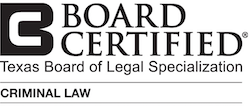Texas Criminal Case Process
Texas Criminal Defense Case Process
If you are facing a criminal accusation, or are under investigation for, or have been arrested for a crime, you likely are seeking legal representation you can trust. Most individuals are frightened and confused when faced with this proposition, and usually desperately seek information as to what is needed to do to protect yourself, your future, and your freedom. It is very often the case that it is the first time an individual has had to defend against a criminal accusation, and so the decision that is made related to whom you choose to seek with legal representation likely could, and most likely will, affect the rest of your life.
Remember that any criminal charges should be taken very seriously. It is always wise, and it should be strongly encouraged, to seek the help of a skilled and experienced criminal defense attorney as soon as possible. Take all precautions necessary to protect what is perhaps the most valuable right a person has - their FREEDOM. Therefore, always carefully choose a criminal defense attorney, and a legal team, with whom you are comfortable.
We hope the information below will help give you a general understanding of criminal justice system process works in Texas. This information is not intended to serve as legal advice. However, you can call The Law Offices of Carl David Ceder at anytime to discuss your case 24 hours a day/7 days a week. To contact The Law Offices of Carl David Ceder please contact us now for an initial consultation at 214.702.CARL(2275) or 469.2000.DWI(394).
Criminal offenses, generally speaking, relate into two different defined categories:
- Felonies ;and
- Misdemeanors.
Depending on the circumstances of the case and the facts involved, a crime can be charged as a felony or misdemeanor. Often, an individual can be charged with either, or both, a felony or a misdemeanor.
A felony is a crime that can have very serious consequences, and can affect you for the rest of your life. A felony conviction can eventually be one where an individual has to spend a significant amount of time in jail. A misdemeanor is a crime that is considered less serious than a felony, and can be punishable by a term in length that is not longer than 365 days in jail. Within each classification vary degrees of severity and consequences.
Possible Investigation
Often a criminal case begins with an investigation, usually by a police department detective or investigator. At this stage of the proceeding, if you feel you are under an investigation for a possible crime, it is wise to seek legal counsel. Police detectives are trained to know how to interrogate to obtain information. That is their job, and most are very good at it. In most circumstances, if you have been contacted by a detective in relation to a possible criminal charge, it is undoubtedly wise to seek a criminal defense attorney. An excellent YouTube video by a Harvard Professor is located at the links located below, and it is an excellent resource for those who may believe it may be wise to come in for police questioning and/or interrogation:
The Arrest
Before actually making an arrest on any suspect, peace officers generally must have a warrant to do so. Although, if there is probable cause that someone has committed a criminal offense, or if an offense is committed in the presence of a police officer, a warrant is NOT required to make an arrest. If you have been detained and the police officer makes it clear that you are not free to leave, you may be under arrest for all legal purposes. This is termed to be a "custodial arrest." Even if the officer did not announce this assertion that a certain person is "not free to leave" and/or actually restrain the person with handcuffs, you can still be under arrest according to the law. However, if you are questioned about your involvement in, or knowledge of a crime, and the answers are going to be used against you in a court of law, those questions must be preceded first by the Miranda warnings. If you choose not to answer the questions, the questioning must stop. Therefore, it is vitally important to know and understand your rights.
Your Rights
After being arrested, it is required that you are taken, without delay, to a magistrate at which time the magistrate must advise you of any accusations against you, any affidavits filed pertaining to the accusations, your rights regarding your ability to have and retain legal counsel, your right to remain silent, your right to have an attorney present during any interviews, your right to terminate any interviews at any time, your right to request a court-appointed lawyer, your to have a fair trial, and your right not to make a statement that may be used against you. It is also your right to have a reasonable amount of time to contact an attorney. Again, always know and protect your rights!
As the accused, you also have the right not to be prosecuted for a felony unless indicted by what is called the "Grand Jury." The Grand Jury in the United States is usually comprised of 12 individuals, and was first proposed in the United States Constitution as a safeguard for a person when charged with a felony without the requisite probable cause.
An individual also has the right of being "Presumed Innocent" - and this right must be held until, and only if, the State of Texas can prove Guilt "Beyond a Reasonable Doubt." An individual also has the right NOT TO INCRIMINATE THEMSELVES (according to the 5th amendment), the right to a speedy trial (it is somewhat limited in the State of Texas), the right to confront any witnesses that may be compelled to testify against an individual (pursuant to the Confrontation Clause of the 6th amendment of the United States Constitution), as well as certain rights of appeal.
Legal Representation
Regardless of where you may be in the overall process of how a criminal case has progressed, you have the right to hire a criminal defense attorney immediately, and at anytime if and when you feel the need to do so. However, the best time to retain legal representation is when you first believe you may under investigation, and certainly when you know verifiably that you will be charged and accused of a crime.
The Booking Process
The origin of the phrase comes from a time when arrestees were brought to the jail and their information was literally recorded in a book. Although most counties still refer to this as "the booking process" when someone voluntarily submits themselves to a jail, in reality what usually occurs is an individual is computers are used to record the name, age, address, and reason for arrest. Then before being placed behind bars, a booking number is the information for an individual is assigned, a mug shot (booking photograph) is taken, and fingerprint records are obtained, and clothing and personal effects can also be collected and inventoried. If you need assistance with a jail release, or you believe you have an active warrant for your arrest, you can read further about the JAIL RELEASE process here. You can contact the Law Offices of Carl David Ceder at anytime for assistance at 214.702.CARL(2275) or at 469.2000.DWI(394). Phones should be answered 24 hours a day/7 days a week for immediate and personal assistance.
Formal Charges
A formal accusation of criminal activity is a charge brought against you, which can be classified as a felony, or a misdemeanor (and in some case as both if multiple charges are filed). After reviewing police reports, statements made by witnesses, and any other evidence, whomever investigated the case at any given police department, then delivers this information the District Attorney where it will ultimately be handled. If a charge is classified as a felony, an individual must be indicted by the Grand Jury for the case to proceed, and a case must be filed by "information" for a misdemeanor charge to proceed. *It should be noted that an indictment is NOT the same legal construction that is the same as an actual conviction.
At this point, only the District Attorney's Office may have the discretion to drop the pending charges against you. Given prior experience, this usually is seldom done. Even in the instance where a victim may not want to prosecute (you can read further on this subject HERE) - the District Attorney's Office can still proceed with the criminal charge (regardless if the victim does not want to proceed with the criminal charge). However, on occasion, the authority of the District Attorney's Office does have the power to drop, or to continue, with the charges against the accused. Regardless, in some cases, whether this occurs can correlate and be influenced by the victim and what testimony may or may not be presented at trial.
Bail
Bail is money paid to the court to guarantee your presence at court at a later date. This is also commonly known as a bail bond. There are a variety of options one can pursue when posting to bail. Usually, one can do one of the following:
- Post the amount of the bond in cash;
- Post the amount with an "Attorney Surety Bond" (you can read more about this here); or
- Utilize a professional bail bond company. Motions to reduce bail can also be made at some point after the amount is determined.
Discovery Process
After bail has been posted, the criminal justice process of formally handling the accusation, in reality, finally begins. You can read more about this process HERE. The pre-trial process, regardless of whether it is filed as a felony or a misdemeanor, is in a basic sense, when the defense and the prosecution ask for and exchange documentation and information relevant to the case. The process overall, which can often be lengthy in terms of time, is called DISCOVERY. During this discovery period, typically, the following is exchanged: arrest reports, diagrams, expert analysis, medical records, photographs, police reports, probation reports, witness statements, and other physical evidence. Other legal issues can be explored and/or determined during the pre-trial hearing process. These proceed through a variety of stages, such as the following:
- First Appearance;
- Announcement settings;
- Plea Settings; and/or contested settings, such as
- Motions to Suppress, or proceeding with a Trial (either by Judge or Jury, to read more about this, please read the following articles: 1)HERE; and 2) HERE);
- Other options which can be explored here would be: the appointment of counsel (if necessary), motions for change of venue, and defense motions to discover or suppress state evidence (as discussed previously).
***It should be noted that as of January 2014, Texas has enacted the new "Michael Morton Discovery Act" (which was a result of the very much publicized case regarding Mr. Michael Morton, who was imprison for a very lengthy period of time which was due, mostly in part, of the District Attorney involved willfully not fully disclosing information that could have inculpated him from being convicted at trial). This new Michael Morton Discovery Act derives, is pursuant to, and ultimately significantly amended Article 39.14 of the Texas Code of Criminal Procedure, and was enacted via Senate Bill 1611. The over-arching theme of this new discovery process allows for criminal defense attorneys very much a wider range of latitude in being able to obtain proper discovery and information on any given case and criminal charge.
Pre-Trial Motions
A vital tool that can be used by a criminal defense team can be the filing of certain pre-trial motions that can aid in obtaining a favorable outcome of any given case. Criminal defense attorneys can force pressure on District Attorney's by employing and utilizing certain pre-trial motions. Common motions that can be filed and ruled upon, may include the following examples: Compel Discovery, Dismiss the Information, Sever Counts, Speedy Trial, Strike Counts, Suppression of Evidence; Motions to Dismiss; and/or Motions to Quash the Indictment in a particular case.
Plea Options
It is possible that your criminal case can be settled between the defense, prosecution, and sometimes with the judge. Typically, you would plead guilty to a lesser crime or fewer charges in exchange for a guaranteed sentence that is shorted than what you might possibly occur if a conviction occurs following a trial. Here, the prosecution is certain of a conviction and a sentence, the defense avoids the risk of a higher sentence, and the judge is able to move on to other cases (which often is a major priority for them, because most judges very much try to move their dockets in the most expedient way possible.
Another plea option would be enter a “non-negotiated guilty plea”, meaning rather than you negotiating a punishment with the prosecutor, the judge or jury assigns the punishment applicable to the crime. When doing this via with a Judge, it is generally known as an "Open Plea" to the judge. If done with a jury, it is generally known as a "Slow Plea" - and it is done to mitigate damage in a case where the facts are unlikely to support a "Not Guilty" verdict, and can therefore be beneficial for the accused.
Trial
According to the Texas Constitution, any suspect in criminal prosecutions has the right to a trial, and has the option to pursue this by either having a judge or jury ultimately not only decide guilt-innocence, but also if a conviction happens to result, the accused usually has the option to decide who will ultimately decide punishment (exceptions would apply if a given offense happens to be a 3(g) criminal offense according to Article 42.12 of the Texas Code of Criminal Procedure).
One does have the option to have either a jury of their peers, or the judge, to decide the guilt-innocence phase of the trial. Similarly, they have the same fight as the same concept of this, with the few exceptions as stated above limited the right of the judge to grant probation if a conviction is ultimately the result. In a bench trial (commonly referred to as a Trial Before The Court, or a "TBC"), judges are the professional triers of fact, and the exclusive authority on questions of law. In a "TBC" trial, the judge makes both findings of fact and rulings of law.
In a jury trial, a jury is the trier of fact. The jury finds the facts and applies them to the law it is instructed by the judge to use in order to reach its verdict. Thus, in a jury trial, the findings of fact are made by the jury, while the judge makes legal rulings as to what evidence will be heard by, regarding questions of law, that the jury and what relevant law governs the case. Jurors are instructed to strictly follow the law as given by the judge, but are in no way obligated to do so.
There are several steps involved if the accused selects a trial by jury, which usually include the following:
- The jury panel is assembled for "Voir Dire" - or what is basically a term for the jury selection process after both the prosecution and the defense have the opportunity to jointly examine the prospective jury panel;
- A jury of six members with misdemeanor cases, and a jury of 12 members with a felony case, is assembled to ultimately deliberate and asked to decide on a verdict following the testimony at trial;
- The indictment (for a felony) and/or information (for a misdemeanor) is read to the jury after they are selected;
- The defendant enters a plea:
- Prosecution and defense have the opportunity to make opening statements (the defense has the option to wait until they present their case in chief;
- The theory of the case of the District Attorney involved with the trial is then presented, and testimony, evidence, and exhibits are considered through witnesses and exhibits, and possibly admitted for the jury to consider - after which, ultimately the state will rest their case-in-chief upon the EVIDENCE presented;
- The theory of the case for the defense is then presented, and testimony, evidence, and exhibits can (but does not have to be) presented through witnesses and/or exhibits;
- The opportunity is then given for rebuttal testimony by either prosecution or defense, usually to dispute testimony presented that either party may wish to contest;
- The jury hears the court’s written jury charge instructions describing the applicable case law pertaining to the criminal case presented;
- Both prosecution and defense make closing arguments in summary of the testimony and evidence presented;
- Jury deliberation then begins and they are formally requested by the judge to render a "true and correct verdict." If, after deliberation, the jury finds the defendant guilty, the trial continues on to the sentencing phase of the trial. If the jury, instead, finds the defendant "not guilty" of the charges they are accused of (which is termed an acquittal), the individual is then vindicated and will immediately be allowed and set free, with no further constraints upon their liberty. Nothing further can be presented to contest the verdict of the jury - because the jury is always deemed the ultimate "trier of fact" of any case;
- If the jury does not come to a unanimous verdict, a mistrial (or often referred to as a "hung jury") will usually be declared, and the case may be tried again later, or the District Attorney's Office may either choose to dismiss, reduce, or engage in a "plea bargain" related to the charge that was unsuccessfully tried, to avoid having another jury deliberate and possibly come to the same conclusion (which can result in a significant portion of the time of the court);
- Sentencing: The judge or jury can be allowed to assess punishment if a conviction results. Many factors discussed above would lead to the decision as to which one should ultimately decide upon.
- Dismissals: A criminal case may be dismissed for a variety of the following reasons:
- Insufficient evidence;
- Evidence is suppressed due to an illegal arrest or search (usually stemming from a certain violation of the 4th amendment of the United States Constitution and deemed an improper search or seizure);
- Mistakes and/or errors in the indictment or information;
- A victim requesting that the defendant pleads guilty to other charges (or asking the District Attorney to dismiss the charge altogether);
- Defendant has no prior arrest record (and may be eligible for certain types of programs, which vary by county, which can ultimately result in a dismissal;
- Certain key witnesses cannot be located.
Possible Collateral Consequences
Whether an individual has been charged with a misdemeanor or a felony, it is possible (and often a guarantee, especially with felony convictions), that the accused may lose the right to vote, possess a firearm of any kind, and/or associate with known criminals. Depending on the circumstances of the case, one may also have to register as a sex or narcotics offender, and/or pay increased penalties in future convictions. In a similar manner, others have collateral consequences regarding immigration issues, such as possibly being deported. However, if a favorable outcome is obtained, some of these consequences may be removed by expungement, or via by a motion to the court. You can read more about collateral consequences HERE.
Appeals Process
If a judgment was made in the form of a conviction following a trial, and a sentence is imposed an individual may not agree with, they may have certain rights to appeal the decision to a higher court. Usually a motion to appeal a verdict has to be filed within thirty (30) days of a conviction. Any such appeals must be done in writing and properly filed with the appropriate office of the clerk where the case has jurisdiction. Normally, the appellate court will accept as true all facts that the trial judge or jury found to be true and accurate, and will only decide and/or conclude if the laws germane to the case were properly understood and correctly applied and governed accordingly. If an appellate court decides a mistake was made and reverses in some way the judgment and/or sentence imposed, it will direct the lower court to render a decision they deem to be in correct fashion. More often than not, any mistakes found are minor, and the judgment is not overturned - and it simply deemed to be "harmless error" - and usually is not deemed to be the kind to be found as "reversible error." You can read more about the appellate process in Texas HERE.
Expungement
An expunction is the process by which a conviction is removed from your records. Ultimately, an expunction makes it possible for you to gain employment that would otherwise be unavailable to you. Texas expunction law is governed by Chapter 55 of the Texas Criminal Code of Procedure.
You may be eligible for expungement if criminal charges against you have been dismissed, if you were acquitted following a trial, if you were pardoned, someone used your name or identification when you were arrested, and/or if you were a juvenile who completed a deferred sentence, or if you were placed on deferred adjudication for a Class C misdemeanor offense, such as Public Intoxication. Texas now allows for an individual to file for an expunction in this manner 180 days following an arrest or a citation given.
The following explains this in more detail:
The rules regarding Texas expunctions have been amended in the legislative session in 2011. Among many minor adjustments the Legislature worked in a very significant change that relates directly to Class C Misdemeanor offenses. Previously, when a person received deferred adjudication for an offense filed as a Class C (filed in a municipal court or justice of the peace court), they would be entitled to file an expunction after completion of the probation period and dismissal, but only after the 2 year statute of limitations expired. This rule was a product of the Texas Supreme Court's holding in the Bhat case. State v. Bhat, 127 SW 3d 435 (2004). Effective September 1, 2011, the Texas Legislature overrode that decision by amending Section 55.01 of the Texas Code of Criminal Procedure.
The new law permits an individual who has a Class C Misdemeanor dismissed by way of deferred adjudication to file for an expunction after the expiration of 180 days from the date of arrest (or non-custodial arrest). The language which overrules the Bhat decision with the following verbiage: "a person is entitled to have all records and files relating to the arrest expunged if...an indictment or information charging the person with the commission of a misdemeanor offense...has not been presented...and at least 180 days have elapsed."
Because Class C Misdemeanors are filed by method of sworn complaint, an indictment or information is never presented. In normal legislative fashion, this is a long and confusing way of saying that a Class C dismissed by deferred adjudication is no longer subject to the 2-year statute of limitation.
Unfortunately, the amendment does not apply in the case of a Class C reduction, as with the case when a higher-level misdemeanor is reduced to a Class C through negotiation. The mere act of reducing a charge to a Class C means that the individual has been charged with something greater. Since anything greater than a Class C is charged by information or indictment, the 180 day rule cannot apply. Class C reductions are still subject to the 2-year waiting period.
One final caveat presents a minor hurdle to a full expunction of the criminal charge. The legislature provided that the court shall permit the prosecuting attorney and law enforcement agency to retain "arrest records and files" of any person who becomes entitled to an expunction by virtue of the 180-day rule, unless the prosecutor certifies that the records are "not needed for use in any criminal investigation or prosecution, including an investigation or prosecution of another person." Whether municipal prosecutors will be receptive to such certifications is yet to be seen.
Some convictions carry consequences that cannot be removed by an expungement, such as having to register as a sex offender following a conviction that carries this as a result.
It is also possible to have your records sealed. While sealing your records does not completely remove the conviction from your record, it will not show up on a background check. This process is completed via filing an "Order of Non-Disclosure."
A quick summary of the process of the criminal justice system can also be located here, which is very clear, concise, and correct with the content present, and can be located with the following link HERE.




















